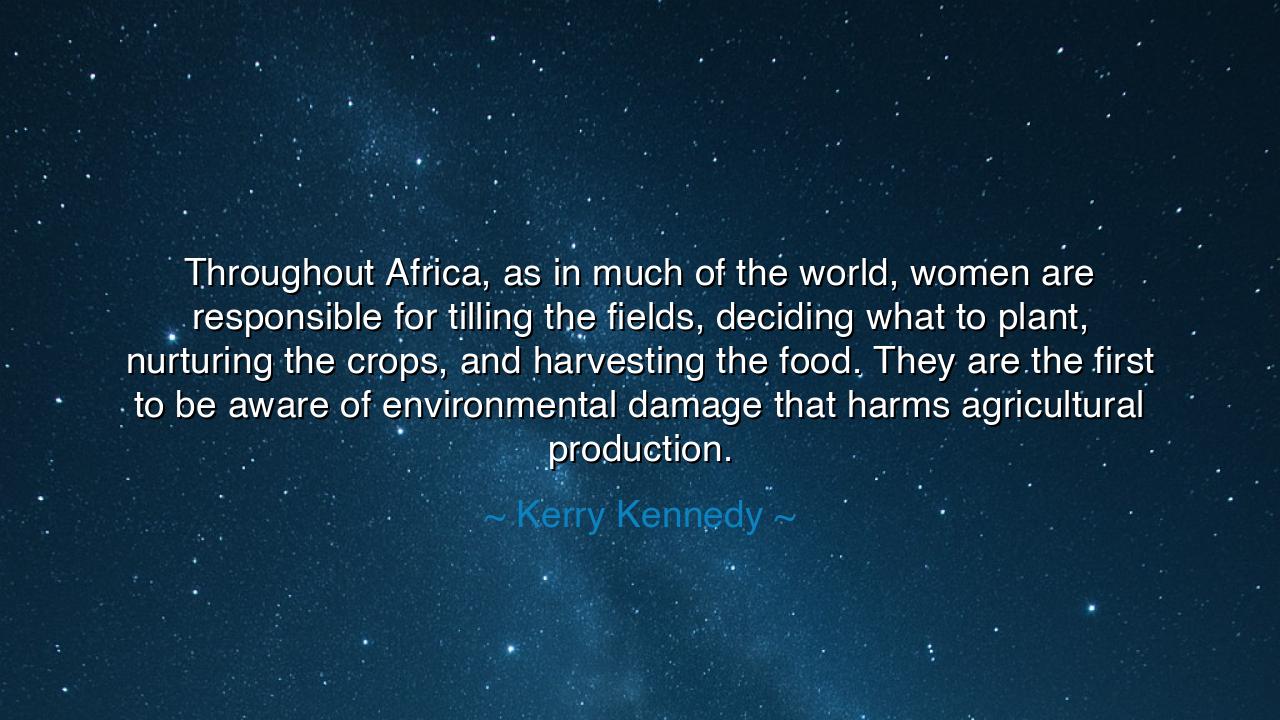
Throughout Africa, as in much of the world, women are responsible
Throughout Africa, as in much of the world, women are responsible for tilling the fields, deciding what to plant, nurturing the crops, and harvesting the food. They are the first to be aware of environmental damage that harms agricultural production.






Hear the words of Kerry Kennedy, spoken with reverence and truth: “Throughout Africa, as in much of the world, women are responsible for tilling the fields, deciding what to plant, nurturing the crops, and harvesting the food. They are the first to be aware of environmental damage that harms agricultural production.” These words are not mere observation, but a recognition of the ancient bond between women, the earth, and the survival of communities. They carry within them both praise and warning: praise for the strength and wisdom of women, and warning that when the land suffers, it is they who bear the burden first and fiercest.
The meaning of this quote lies in unveiling the hidden labor that sustains life. Across generations, women have bent their backs to the soil, coaxing forth sustenance with patience and care. Their hands sow the seeds, their wisdom chooses the right season, their endurance brings forth the harvest. In truth, civilization itself rests upon this foundation, though it is often ignored by those who sit far from the fields. Kennedy reminds us that women are not merely participants in agriculture—they are its heart, its mind, and its guardians.
And because they are so closely bound to the earth, women are also the first to perceive its wounds. When rains fail, when the soil grows thin, when pests devour the crops, it is the women who see the change before any official or distant leader. Their eyes measure the emptiness of baskets, their hands feel the cracks in the earth, their children suffer first when the harvest is poor. Thus, they become the earliest heralds of environmental damage, speaking truths that others might ignore until too late.
Consider the story of Wangari Maathai of Kenya, who looked upon the hillsides stripped bare by deforestation and listened to the cries of women who could no longer find firewood or clean water. She taught them to plant trees, one by one, until green returned to the land and the strength of the people was restored. Her Green Belt Movement, born from the labor of women, transformed not only the soil but the spirit of a nation. Her story is living proof of Kennedy’s words: that women, bound to the earth by necessity and love, are the first to sense its suffering and the first to rise in its defense.
The origin of this truth stretches back into antiquity. In every early society, from the Nile Valley to the banks of the Tigris, it was the women who knew the secrets of seeds, of herbs, of the cycles of growth. Men may have built empires and waged wars, but the quiet continuity of life was guarded by women in the fields. When the floods failed or the locusts came, they adapted, invented, and persevered, ensuring that children did not perish. The world owes its survival to this overlooked stewardship.
The lesson is clear: if we would guard the earth, we must listen to the voices of women. They are the ones whose daily labor ties them most closely to the rhythms of nature, and whose wisdom is sharpened by necessity. To dismiss their knowledge is to turn away from the earliest warnings of catastrophe; to honor it is to gain foresight and resilience. The health of the land and the survival of communities cannot be separated from the empowerment of women.
Practically, this means supporting education for women, ensuring their voices are heard in councils of agriculture and environment, and valuing their role not as mere laborers but as leaders. It means creating policies that listen to the first witnesses of change, instead of waiting for distant experts to confirm what women in the fields already know. Above all, it means honoring the bond between earth and nurturer, between the soil and the hands that till it.
Thus, let Kennedy’s words be carried forward: women are the guardians of the fields, the first to see the scars of environmental damage, and the key to healing the land. If we are wise, we will learn from them, support them, and walk beside them, so that the earth and its people may endure together in strength and harmony.






AAdministratorAdministrator
Welcome, honored guests. Please leave a comment, we will respond soon